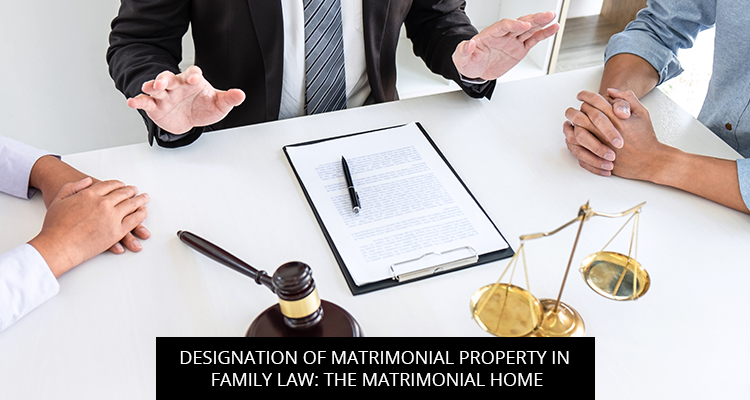
The Division of matrimonial property is amongst the most pressing concerns at the time of breakdown of marriage. The leading of these concerns is perhaps the most significant asset owned by many Canadians, the family home or residence. Other concern might be the splitting of any other matrimonial assets, such as the Canada and/or Quebec Pension Plan credits.
At the end of a marriage, the law acknowledges the equal contribution of each spouse and specifies that the value of any property attained by them during the marriage ought to be divided equally. The law provides for some property to be excluded, such as gifts or inheritance received from someone other than a spouse. A matrimonial home relates to married couples and does not extend to the common-law spouses or cohabiting spouses, as long as the gift or inheritance has not been used to shield the matrimonial home.
What Is A Matrimonial Home?
A home where the married couple was living at the time of separation is called a Matrimonial Home. In Ontario, Section 18(1) of the Family Law Act, R.S.O. 1990, c. F.3 (FLA) defines the matrimonial home as “every property in which a person owns an interest and or, was at the time of separation (if the spouses have separated) ordinarily possessed by the person and his or her spouse as their family residence is their matrimonial home.”
Can More Than One Home Qualify As A Matrimonial Home?
Under this definition, more than one property can be classified as a matrimonial home. Thus ‘every property’ may it be your holiday cottage, city residence or a secondary property, as long as it is used regularly by the spouses as a family, and were used at the time of separation, may be deemed as a matrimonial home.
Also, where a home owned by one of the spouses prior to marriage, is occupied as the ordinary residence by both spouses after marriage, the home will be treated once again as a matrimonial home.
It is pertinent to note that a property will likely lose its designation as a matrimonial home, in case a secondary property once taken up as an ordinary residence, is then placed on rent for income purposes, that property can no longer be considered as a matrimonial home.
How Is The Matrimonial Home Dealt In The Property Division?
The answer to this can be better determined by first understanding how matrimonial property division is treated under the law. First of all, the ‘net family property’ is determined which is owned by each party to a divorce on the date of separation, excluding any gifts or inheritance you received from someone, money you acquired as a result of some personal injury, or money you got from an insurance company as a result of someone’s death.
Net family property is determined by noting the total assets of both parties on the date of separation, withdrawing the pre-marital cost (if applicable; with exception to the matrimonial home), and deducting any debts, the amount which remains is the ‘net family property. After the net family property of both spouses, the spouse with the higher net family property is required to pay half the difference between theirs and the other partner’s net family property. This is called the equalization of net family property payment.
Pre-Marital Value Of Property Not Deducted
The pre-marital value cannot be deducted in the case of the matrimonial home. For instance, a house purchased pre marriage for $600,000 may increase in value to $900,000 during the marriage, in such a case the $600,000 cost of the house may not be deducted from the property, and the full $900,000 is taken into account into the net family property.
Moreover, any excluded property such as gifts or inheritance once ‘touched by the matrimonial home’ fail to retain their protection as well. Therefore, if gifts and inheritance are used on the matrimonial home they will be considered as part of the net family property accordingly.
Conjunctively, inheritance may lose the protection of excluded property when a house is used as the family home. Simply, the excluded-inherited property loses any protection when occupied as a place of ordinary residence by the family.
Possession Of The Matrimonial Home
Under Section 19 of Family Law Act 1990 spouses have an equal right to the possession of the matrimonial home. This implies that a unilateral eviction of one spouse by the other cannot take place even if the ownership of the matrimonial home rests with one party or the other. However, either one of the spouses may approach the Courts for the acquisition of exclusive possession of the property for a period of time the court orders.
Factors For The Determination Of Exclusive Possession
In determining exclusive possession application, the court relies upon following factors given under Section 24(3) of FLA 1990:
- The best interest of the child(ren) (if any)
- Financial position of both spouses
- Any written agreement between both parties
- Any domestic violence or abuse by one party towards other spouse or the children
- Availability of alternative suitable and affordable living arrangement to one party or the other
Our Expert Lawyers Can Guide You
In order to mitigate the complexities involved in the matrimonial home’s treatment, it is highly advisable to hire an experienced divorce lawyer. If you are looking for an experienced Family-law lawyer in Canada, Ayaz Mehdi Professional Corporation can assist you at the most reasonable cost.
Disclaimer: Kindly note that sending or receiving information through this site does not establish a solicitor-client relationship. Legal matters are fact-specific, and the law is variably changing. The views expressed and the content provided on this blog are general guidelines and cannot substitute for proper legal advice. Schedule your legal consultation by clicking here: Let’s meet!






